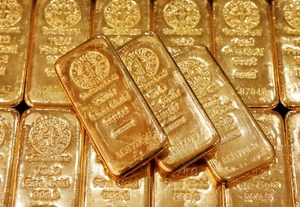 Gold from Mexico. |
On the basis of this mineral wealth, the Spanish empire became the largest and richest in Europe through the 16th century. The government rapidly grew dependent on a steady source of virtually unearned income from South America, the introduction of so much bullion caused inflation rates to soar, and merchants flocked to Spain from all Europe to sell their finest wares at premium prices.
After a century, the mines stopped producing, the Spanish economy tumbled and the empire partially disintegrated. Easy money from American distorted economy and society, creating artificial wealth and power that disappeared when the metals ran out. Spain experienced terrible difficulties in readjusting to paying its own freight; four centuries of isolation and introversion followed as a result. Only in the last decade has Spain begun to reemerge and rejoin the mainstream of European life.
In the late 20th century, everything happens faster and in extremes, but the deluge of free money that oil-exporting countries have received during the past few years resembles the silver revenues of Spain centuries ago. The OPEC members also enjoy great wealth and power, even though they have done nothing to earn them; without skills, culture or work of their own, these countries have acquired great influence and prestige.
No one has a clear idea how long the prices and production levels of oil will remain so high - perhaps not through this century, possibly for over a hundred years. The one sure thing is that the oil boom will end, as all booms do. Energy substitutes, a superpower division of the OPEC states or nuclear war might bring about such a change. Even if nothing dramatic reduces oil revenues, many OPEC countries will run out of oil in 10 to 25 years, should they continue to produce at present levels without finding new reserves.
 However the boom does end, the awesome transfer of wealth now taking place will stop. Countries addicted to fabulous revenues will face a drastic reduction. For example, Saudi Arabia, with a population of five million, receives about $100 billion in 1980, some $20,000 per person; this cannot go on indefinitely. The consequences of a drop in revenues can be predicted with confidence: social disruption, political unrest and economic disintegration. It is never easy to stop being rich.
However the boom does end, the awesome transfer of wealth now taking place will stop. Countries addicted to fabulous revenues will face a drastic reduction. For example, Saudi Arabia, with a population of five million, receives about $100 billion in 1980, some $20,000 per person; this cannot go on indefinitely. The consequences of a drop in revenues can be predicted with confidence: social disruption, political unrest and economic disintegration. It is never easy to stop being rich.
This may not be true for Iran, however. Since the movement to overthrow the shah gathered momentum in 1978, Iranians have concentrated on political issues, almost totally ignoring economic matters. As a result, an important but little-noticed event has taken place: Iran made the transition to a post-oil economy. It is the only major oil exporter to abandon the heady billions and return to live by its own means. Although this transition is neither easy nor complete, it has gone so well this far because it was undertaken voluntarily.
Iranians themselves chose to destroy the old regime and to scale down the shah's great economic projects. They canceled a gas pipeline to the Soviet Union, stopped oil sales to South Africa, Israel, and the Philippines and forced the United States to cut off trade by holding American diplomats hostage. Two years ago, Iran exported six million barrels per day; now it may send out less than half a million per day. Despite a doubling in the price of crude oil, Iran's revenues have dropped by about three-quarters.
From a distant vantage point, this voluntary cut in oil exports may be the most significant aspect of the Iranian revolution. While other countries have yet to return to life without oil billions, Iran has taken the step. It still relies on some oil income, and the revolution is not over. But what may come will probably be minor compared with the future agonies of other oil exporters. The key point is this: because Iranians themselves, not an external force, reduced their dependence on oil, a potentially catastrophic problem seems to have passed quite easily.
May the rest of OPEC be so fortunate.